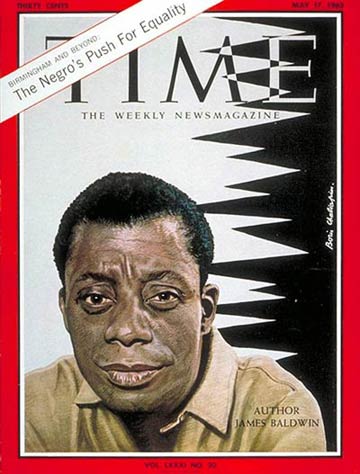
James Baldwin
STROLLING down a quiet street in a small town, James Baldwin came upon a scene that has since haunted his dreams. From a sunlit patch of grass came the singing laughter of a child. Baldwin looked —and saw a white man swinging his little daughter in the air. "It didn't last for more than a second," recalls Baldwin, "but it was an unforgettable touch of beauty, a glimpse of another world. Then I looked down and saw a shadow. The shadow was a nigger—me."
To Author James Baldwin, 38, this parable reveals everything worth knowing about the black man's view of himself in 20th century white America. It also reveals much about James Baldwin himself. He is not, by any stretch of the imagination, a Negro leader. He tries no civil rights cases in the courts, preaches from no pulpit, devises no stratagems for sit-ins, Freedom Riders or street marchers. He published an essay in 1959 called Nobody Knows My Name, and four years later, in Birmingham and Harlem, and in all the Birminghams and Harlems in the nation and the world, most Negroes still do not know his name. He is a nervous, slight, almost fragile figure, filled with frets and fears. He is effeminate in manner, drinks considerably, smokes cigarettes in chains, and he often loses his audience with overblown arguments. Nevertheless, in the U.S. today there is not another writer—white or black—who expresses with such poignancy and abrasiveness the dark realities of the racial ferment in North and South.
Last week Baldwin was in California, hopping from city to city to talk to college and high school students. Thrust from typewriter to rostrum by virtue of a widely acclaimed, blistering essay in The New Yorker (TIME, Jan. 4), now in book form under the title The Fire Next Time, Baldwin spared his audiences nothing. He spoke not for himself but for all Negroes to all whites. "I hoed a lot of cotton," he said. "I laid a lot of track. I dammed a lot of rivers. You wouldn't have had this country if it hadn't been for me ... When I was going to school. I began to be bugged by the teaching of American history, because it seemed that history had been taught without cognizance of my presence. It is my responsibility now to give you as true a version of your history as I can."
Identity & Myths. The history, as Baldwin sees it, is an unending story of man's inhumanity to man, of the white's refusal to see the black simply as another human being, of the white man's delusions and the Negro's demoralization. The theme floods his novels and essays. The white man, he writes, is guilt-ridden and sex-ridden, and he has managed over the years to delude himself by transferring his own failures onto the Negro. "At the root of the American Negro problem is the necessity of the American white man to find a way of living with the Negro in order to be able to live with himself. And the history of this problem can be reduced to the means used by Americans—lynch law and law, segregation and legal acceptance, terrorization and concession—either to come to terms with this necessity, or to find a way around it, or (most usually) to find a way of doing both these things at once ... In this long battle, the white man's motive was the protection of his identity; the black man was motivated by the need to establish an identity." And this has led
